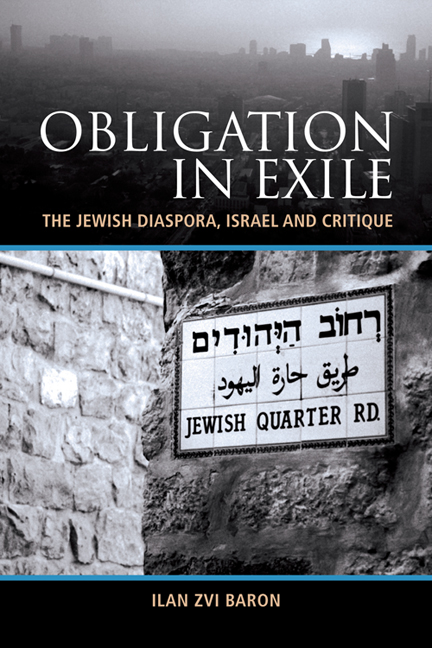Book contents
- Frontmatter
- Contents
- Acknowledgements
- Preface
- Introduction
- 1 The Limits of Political Obligation
- 2 Power and Obligation
- 3 Between Zion and Diaspora: Internationalisms,
- 4 From Eating Hummus to the Sublime
- 5 Obligation and Critique
- Conclusion: Obligation in Exile, Critique and the Future of the Jewish Diaspora
- Appendix
- Notes
- Bibliography
- Index
Introduction
Published online by Cambridge University Press: 05 September 2016
- Frontmatter
- Contents
- Acknowledgements
- Preface
- Introduction
- 1 The Limits of Political Obligation
- 2 Power and Obligation
- 3 Between Zion and Diaspora: Internationalisms,
- 4 From Eating Hummus to the Sublime
- 5 Obligation and Critique
- Conclusion: Obligation in Exile, Critique and the Future of the Jewish Diaspora
- Appendix
- Notes
- Bibliography
- Index
Summary
I grew up with a strong attachment to a country that I did not know very well. Nevertheless, as I learned more about Zionism and Jewish history I became a committed Zionist (albeit one who felt that logically, if I argued for the right of Jewish self-determination, I could not simultaneously reject the right of self-determination for the Palestinians). What eventually came to interest me was how I was to explain this connection with Israel, a country I could not vote in, did not live in and whose language I was not fluent in. I eventually encountered the view that to be a Jew meant supporting Israel, that being a good Jew meant being a Zionist. But over time this position became increasingly problematic. I found it difficult to explain the connection, one that seemed to come with an obligatory duty to support Israel, or at least an obligation to feel a connection to Israel. Questions arose about what it meant to support a country whose political future I have no say in as a Diaspora Jew. The questions became all the more pronounced the more I learned about Israel's history. Many Jews feel the same way, and often are uncomfortable with what such an obligation can mean, in no small part because of concerns over being identified with Israel because of one's Jewish heritage or because of the overwhelming significance that Israel has come to have for Jewish identity.
Israel's significance is matched by how much is published about Israel. Increasingly, this literature is not only about trying to explain Israel's wars, the military occupation or other parts of its history, but about the relationship between Diaspora Jewry and Israel. One influential critique of this relationship is Peter Beinart's 2010 article in the New York Review of Books, where he commented on the failure of American Jewry to engage in any healthy debate about Israeli policy and about what it means to be a liberal American Zionist.
- Type
- Chapter
- Information
- Obligation in ExileThe Jewish Diaspora, Israel and Critique, pp. 1 - 40Publisher: Edinburgh University PressPrint publication year: 2014

